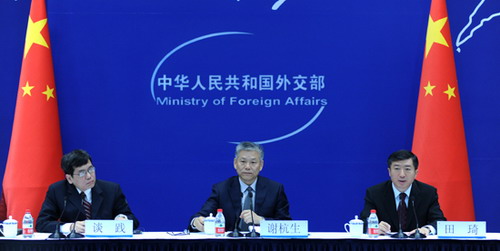Wen to outline sustainable development policies
 0 Comment(s)
0 Comment(s) Print
Print E-mail China.org.cn, June 19, 2012
E-mail China.org.cn, June 19, 2012
Premier Wen Jiabao left Beijing on Tuesday for the United Nations Rio+20 conference on sustainable development and a visit to Brazil, Chile, Uruguay and Argentina to boost ties and cooperation with Latin American countries.
 |
|
Vice-Minister of Foreign Affairs Xie Hangsheng (Middle) speaks on the United Nations Rio+20 conference on sustainable development at a news briefing. |
Wen is expected to outline China's policies on sustainable development when he addresses the UN conference, which will be held from Wednesday to Friday in Rio de Janeiro of Brazil, Vice-Minister of Foreign Affairs Xie Hangsheng revealed at a news briefing.
"The development of green economy will be a long-term and daunting task, we believe the international community should strengthen cooperation in this area and avoid shortcomings," Xie said.
"It is necessary to provide a favorable external environment for developing countries, in particular support for financing, technology and capacity-building," Xie said.
Beijing has long insisted on the principle of "common but differentiated responsibilities' of developed and developing nations.
"Our position is when establishing sustainable development goals, the Rio principles should be adhered to, especially 'common but differentiated responsibilities'," said Tan Jian of the Foreign Ministry's Department of International Organizations and Conferences.
A series of agreements are expected to be signed with each country including bilateral cooperation on agriculture and quarantine, according to Xie.
"Sustainable development is an important issue relating to the future generations of all countries, while strengthening international cooperation and seeking common prosperity is the only way to achieve it," Chinese Assistant Foreign Minister Ma Zhaoxu said at a sideline event ahead of the Rio+20 summit last Saturday.
China attaches great importance to the summit, Ma said, calling for political will and wisdom to achieve new progress in sustainable development.
China has made a six-point proposal to the upcoming summit, Ma said.
First, efforts should be made to uphold the principle of "common but differentiated responsibilities," a major achievement of the 1992 Earth Summit in Rio and which serves as the guiding principle of international cooperation.
Second, the development of society, economy and environmental protection should be balanced. The summit should promote comprehensive, balanced and sustainable development of mankind.
The third is to open up broad prospects for the green economy, which is important to achieving sustainable development, eradicating poverty and restructuring economies. China hopes the summit could promote international cooperation in promoting the green economy and address the concerns of developing countries.
The fourth is to promote the establishment of mechanisms for sustainable development, which could help resolve the practical difficulties of developing countries.
The fifth is to effectively provide support and assistance for developing countries, which are the weak link in the chain of sustainable development. The summit should develop specific implementation plans to provide financial assistance, debt relief and transfers of technology for developing countries.
The last is to initiate the process of setting goals for sustainable development. The summit should clarify the guiding principles of achieving the goals, which should also be an effective complement to the Millennium Development Goals.
As a responsible developing country, Ma said, China has actively been promoting international cooperation in sustainable development and has fully honored its commitment to the international community with unremitting efforts to promote global sustainable development.
China has participated in the Rio+20 with a positive and constructive attitude, he added.
The June 20-22 Rio+20, the largest United Nations conference ever to be held in Rio de Janeiro, Brazil, will bring together leaders from more than 190 nations who will reach a series of political agreements to improve people's standard of living and protect the environment.
Twenty years after the 1992 Earth Summit in Rio, the United Nations is again bringing together governments, international institutions and major groups to discuss a range of measures to reduce poverty while promoting decent jobs, clean energy and more sustainable and fair use of resources.






Go to Forum >>0 Comment(s)